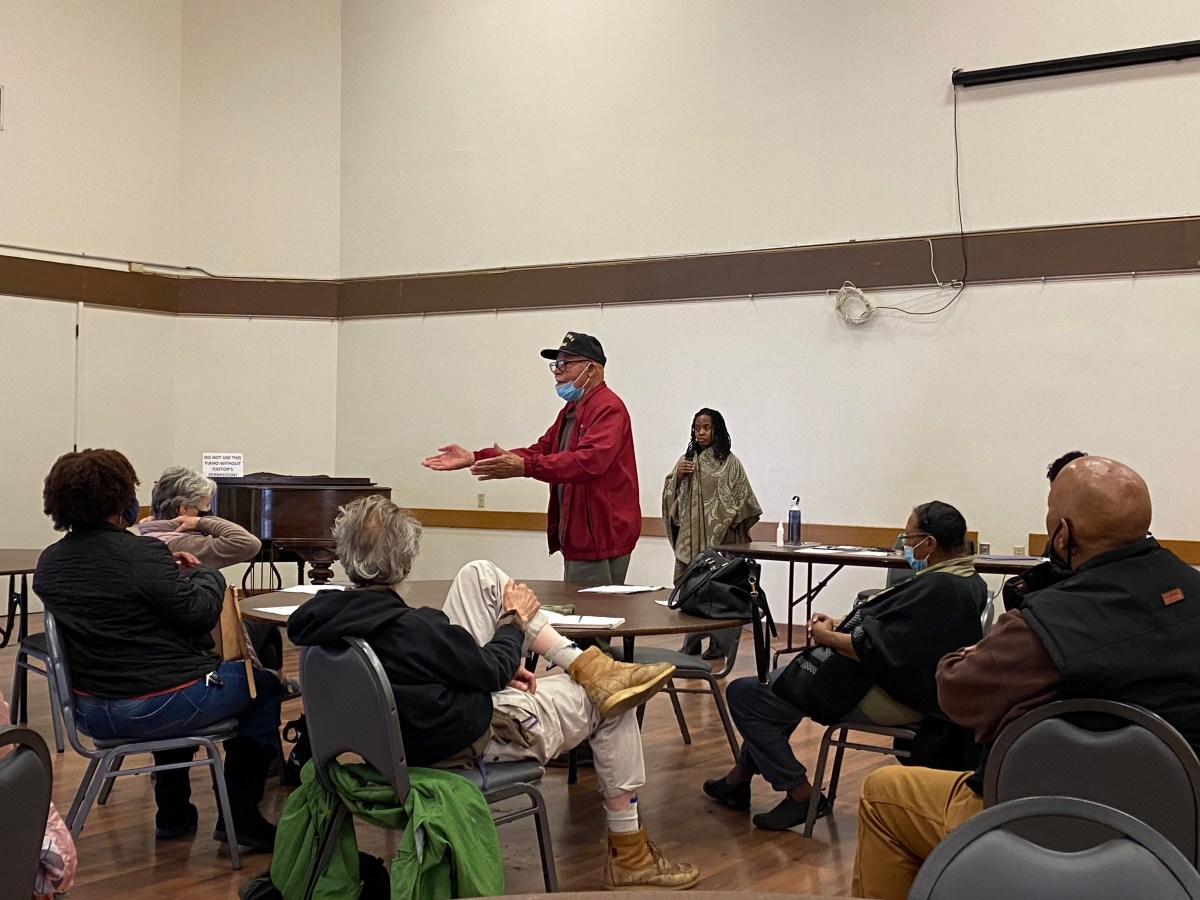Supporters of the Oakland A’s Howard Terminal ballpark and mixed-use development project say the $12 billion project, one of the largest in the region if built, would transform and revitalize the Oakland waterfront. But a town hall forum held Saturday, organized by District 3 City Councilmember Carroll Fife, gave voice to opposition rooted in West Oakland.
The majority of the 50 attendees gathered at Taylor Memorial United Methodist Church strongly opposed the plan, worrying it will worsen traffic congestion and pollution.
“I oppose the deal,” said community organizer and activist Melody Davis. “How dare we let one man have that much property?”
A’s owner John Fisher and team president Dave Kaval have proposed building a 35,000-seat ballpark, 3,000 units of housing, 1.5 million square feet of offices, 270,000 square feet of retail space, a hotel, entertainment venue, and 18 acres of parks and open space along the Oakland Estuary, west of Jack London Square.
The estimated $12 billion project took a step forward last month when the majority of the Oakland City Council approved the environmental review of the A’s Howard Terminal ballpark and mixed-use development project, smoothing the way for city negotiators to work out a financial deal with the A’s.
The town hall came days after the state Seaport Planning Advisory Committee recommended keeping Howard Terminal for maritime use rather than allowing a ballpark to be built there, a potential setback. The state San Francisco Bay Conservation and Development Commission has a final say. That board meets in June.
What’s “affordable”? And other community concerns
Among West Oakland and Chinatown residents, there remain concerns about how much affordable housing the A’s will commit to funding and building and whether the project will gentrify those nearby neighborhoods by driving up the cost of housing. The current terms call for 35% of new housing built as part of the development package to be affordable housing, including 15% of new residences constructed at Howard Terminal.
A new community fund of up to $411 million, mostly from the transfer fee of condo sales, would be established over the life of the 66-year lease. Residents at the town hall meeting on Saturday questioned what would be considered “affordable” and worried the project could push more longtime West Oaklanders out of the area—or even onto the streets. One resident suggested affordability should be set by what residents who live within blocks of the project site can afford.
Other residents expressed concerns about how much the city and county might pay in improving streets, pedestrian and bicycle paths, and other needed infrastructure improvements. Part of the ongoing negotiations is the question of whether the city will create an infrastructure facilities district to help cover those costs, and whether the Alameda County Board of Supervisors will join that tax district.
“If they stay in Oakland, it’s because they pay every cent of the cost,” plus provide community benefits, said housing and tenants rights activist James Vann. “It should all come out of their pockets.”
West Oakland is surrounded by major freeways and without increased transit options or a new freeway exit leading to the stadium, West Oakland resident Rita Look worries air quality will only get worse.
“What I see is a massive traffic jam surrounding West Oakland, polluting our air,” Look said.
Residents in attendance Saturday applauded Fife for taking a stand against approving the environmental impact report. Fife voted no along with Councilmember Noel Gallo, who represents Fruitvale and other District 5 neighborhoods. Fife, whose district includes West Oakland and Howard Terminal, said she is not opposed to the project but believes the process is moving too quickly, at the expense of hearing from thousands of residents whose daily lives will be forever impacted.
“In everything I do, you are going to see me go overboard when it comes to community input,” Fife said.
Should Oakland voters—not City Council—determine the fate of Howard Terminal?
After taking comments and questions from residents, Fife raised a big question: Instead of a City Council vote, should the fate of the development project rest with Oakland voters? She indicated she may support such a ballot measure.
“When money is involved and billionaires are involved, they tend to make the decisions of how things play out in our society. And I want to counter that,” Fife said. “I think it is wise and prudent for the voters of Oakland to make the decision. I don’t know how other people feel about that.”
The question was met with applause and approval from the majority of the crowd, but not everyone was on board. Look said she worried “billionaires are going to control the message” and cause voter confusion.
Longtime West Oakland resident David Peters said it should be left up to elected officials.
“Our representatives have the resources and the time and the pay to do their jobs and represent the voices of the people,” said Peters, who is a member of the Howard Terminal community benefits steering committee on culture and history. “You have the access to city staff and the pay to do this stuff. We are not paid.”
Any measure proposed by a councilmember requires approval from the majority of City Council.
Reached Sunday, A’s president Dave Kaval called the idea concerning and said it “brings added uncertainty about our approval process in Oakland.” Kaval pushed back on the perception that the A’s haven’t done enough outreach.
“I fiercely push back on that,” he said. “I think it’s had one of the most robust processes in engaging the community.”

